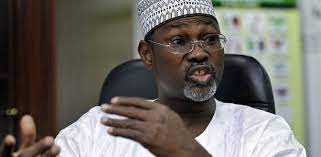Politics
Jega decries desperate politics, says no election is perfect

Former Chairman of the Independent National Electoral Commission (INEC), Prof. Attahiru Jega, has expressed concern over the persistent desperation among Nigerian politicians, warning that their “do-or-die” attitude continues to compromise the integrity of elections and hinder democratic progress.
Jega made the observation on Monday while delivering a keynote address at the joint graduation ceremony of the National Institute for Legislative and Democratic Studies (NILDS) and the University of Benin (UNIBEN) in Abuja.
The former INEC boss, who lectures Political Science at Bayero University, Kano, lamented that even after 25 years of uninterrupted democracy since 1999, Nigeria still grapples with electoral malpractice, violence, and a lack of public trust in the electoral process.
“When we see the desperation of these politicians, it is very clear, as former President Obasanjo said, that they engage with elections with a ‘do-or-die’ mentality.‘We must win by whatever means are necessary,’” he said.
Jega warned that such attitudes have steadily eroded citizens’ confidence in democracy, leaving the country “literally muddling through democratic development” since its return to civilian rule.
“No elections are perfect and none are likely to ever be,” he noted, explaining that electoral integrity “is relative and measured as a continuum from the extreme worst-case scenario to the ideal best-case scenario.”
According to him, Nigeria’s politics has for decades been marred by the quest for power at all costs — a trend that gained notoriety in 2007 when then-President Olusegun Obasanjo described the general elections as a “do-or-die affair.”That statement, he said, captured the zero-sum nature of Nigerian politics, where contests often degenerate into violence, ballot snatching, vote-buying, and prolonged court cases.
To restore faith in the process, Jega emphasised the need for “continuous concerted efforts” to reform the electoral system, strengthen institutions, and promote ethical conduct among politicians.“The credibility of elections has a direct correlation with the quality of representation and governance,” he added.
In his remarks, the Vice Chancellor of the University of Benin, Prof. Edoba Omoregie, applauded President Bola Tinubu for introducing the student loan scheme, describing it as a policy that has “minimised education barriers” for underprivileged students.
“The establishment of student loans, therefore, has minimised education barriers. It is the reason why Nigerian students, no matter their economic status or that of their parents and guardians, can access funding for their tertiary education in public universities with ease,” Omoregie said.
He congratulated the NILDS/UNIBEN graduating class—comprising 46 Master’s, 19 Higher National Diploma, and nine Postgraduate Diploma awardees—for their resilience and academic achievement, describing the occasion as “historic” and a celebration of excellence.





















